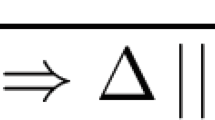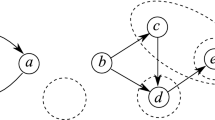Abstract.
This paper shows that any sequence \( \psi_ n \) of tautologies which expresses the validity of a fixed combinatorial principle either is “easy”, i.e. has polynomial size tree-resolution proofs, or is “difficult”, i.e. requires exponential size tree-resolution proofs. It is shown that the class of tautologies which are hard (for tree resolution) is identical to the class of tautologies which are based on combinatorial principles which are violated for infinite sets. Further it is shown that the gap phenomenon is valid for tautologies based on infinite mathematical theories (i.e. not just based on a single proposition).¶A corollary to this classification is that it is undecidable whether a sequence \( \psi_ n \) has polynomial size tree-resolution proofs or requires exponential size tree-resolution proofs. It also follows that the degree of the polynomial in the polynomial size (in case it exists) is non-recursive, but semi-decidable.
Similar content being viewed by others
Author information
Authors and Affiliations
Additional information
Received: November 8, 2000.
Rights and permissions
About this article
Cite this article
Riis, S. A complexity gap for tree resolution. Comput. complex. 10, 179–209 (2001). https://doi.org/10.1007/s00037-001-8194-y
Issue Date:
DOI: https://doi.org/10.1007/s00037-001-8194-y




